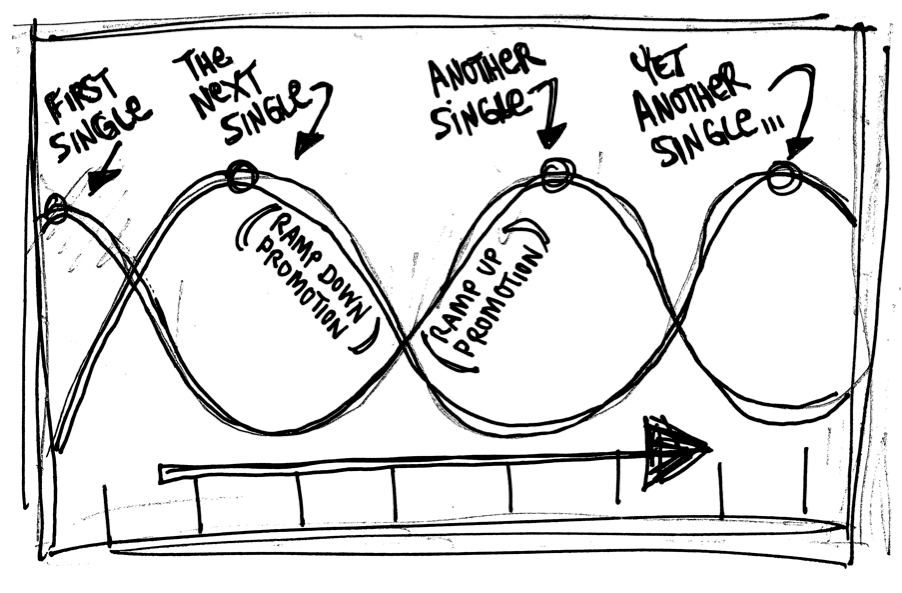A reader emailed asking about albums vs. singles and whether it’s now an accepted strategy to release a single every couple of weeks. These singles could lead to an album (a collection of the singles) or maybe not. Perhaps in 2020, the reader posits, the steady stream of singles is the new album.
I often talk about branding as a shared expectation among fans. That’s important to keep in mind as I answer this question. The frequency, format, and timing of a release is part of the artist’s branding and plays a significant role in setting expectations.
If a single gets released every two weeks, then the act becomes a ‘singles’ band, probably lumped into the pop space. Any extended break in this routine creates disappointment. A frequent release schedule also requires constant engagement with fans. Without the month-long build-up of an album, the days before and after multiple singles need a repeating but unique promotional ebb and flow.

The frequent single is a by-product of social media — it exists to feed the newsfeed and keep the artist in the online spotlight. If the artist (or her team) isn’t on top of online engagement, then the creative effort of regularly releasing singles is wasted.
Albums also say something to an audience. While singles are an invitation to melody and hooks, albums promise distinctive instrumentation and production qualities. Of course, albums can have catchy choruses — and singles are allowed to blow us away with incredible production — but the format the artist relies upon implies a prejudice to the fan. One wouldn’t expect Radiohead to turn into a monthly singles-only band, but this branding wouldn’t be out of place for Taylor Swift.1This sentence seems outdated as I revisit it now in early 2021. The pandemic has turned Swift into quite an impressive album artist!
Albums are less exhaustive to promote. However, there should be a supernova of activity in the weeks leading up to the release date and the following period. Album strategies welcome preparation, a steady build in hype, and extended reminders of the project post-release.
The artist often takes a break from heavy promotion while in-between albums. Consistently released singles, on the other hand, are here and gone, but the artist remains focused and in the spotlight.
Albums can have a defined press strategy. Prominent press outlets — online and print — are biased toward albums. An artist promoting an album or on tour because of an album is more likely to get featured. Singles artists should concentrate on premieres with influential blogs. A good relationship with a blog or outlet for regular premiere appearances can break a singles artist.
As for outsourcing PR, an album artist can hire a publicist per project for a few months at a time. A singles artist, on the other hand, would hire a publicist on a retainer to work each release and the artist’s profile in general.
As you can see, your release format signals the type of artist you are. This decision helps target a fanbase, influences the music, and determines the strategy. That said, the beauty of digital formats is that they don’t have firm boundaries. You’re free to play with expectations. For example, you can release surprise singles with experimental ‘b-sides.’ Or an occasional series of singles eventually collected on a forthcoming album — except the album versions are entirely different. And EPs can be a lot of fun, too. EPs allow more frequency than albums but retain the accepted qualities of a long-player. Then there are cassettes. We’ll be talking about cassettes on the blog later.
These choices, including the bending of expectations, transmit branding messages to your fans. Thus, the album isn’t dead, nor is the bi-weekly single the way of the future. Look closely at who you are as an artist and the type of fans you aim to attract. The nature of your next release resides in that reflection.
🔗 previously → The Album, If You Want It



